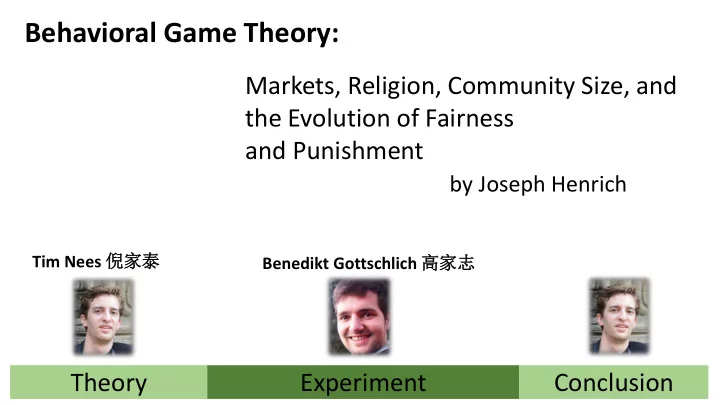

Behavioral Game Theory: Markets, Religion, Community Size, and the Evolution of Fairness and Punishment by Joseph Henrich Tim Nees 倪家泰 Benedikt Gottschlich 高家志 Theory Experiment Conclusion
The Dictator Game Maximization of Pay-off vs. Costly Fairness
Conflictive Theories Expansion Theory Evolution Theory Social Norm Social Norm Social Norm
How Do We Measure Societies? Markets Subsistence Economy Market Economy Tribal Religion Religion World Religion Small Communities Big Communities Community Size
What makes the difference? Family/ Clan Anonymity/ Institutions Fairness Applies to Applies to unknown people known people Punishment
Evolution How to find out: Test for Norms in anonymious setting Experiment
“ Third-Party Punishment Game ” makes an offer A B 100$ 100-20= 80$ 80-30=50$ 20$ can invest 20% of his allo- cation to punish player A if so, A looses triple receives one-half the amount paid by C 50$ 50-10=40$ C of the stake (guaranteed!)
Experimental Setting Dictator Game (DG) Ultimatum Game (UG) Third-Party Punishment Game (TPG) Measure of Measure of Measure of behavioral fairness behavioral fairness behavioral fairness Measure of Measure of punishment punishment
Results: Linear Regression Model for Offers (additional control variables: sex, age, community size, education)
Results: Market Integration & Mean Dictator Game offers
Community Size & Punishment The bigger the com- munity, the earlier unfair behaviour is punished
Conclusion Societies are different - Caution with interpretation Two Theories: of experiments Expansion of Norms Evolution of Norms
Recommend
More recommend